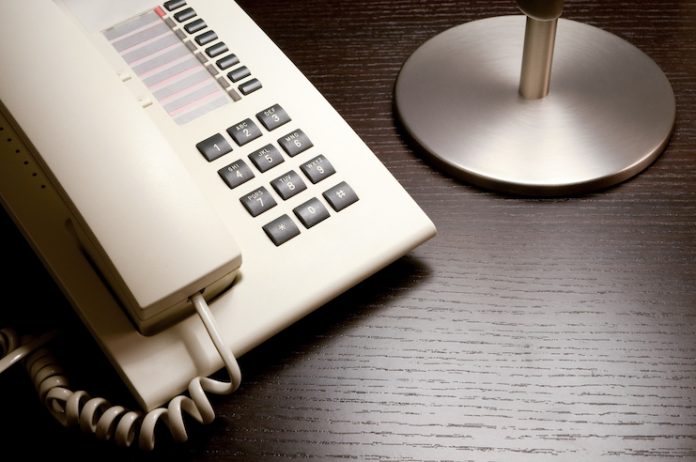Technology continues to push businesses forward toward increased efficiency. The ongoing integration of now-ubiquitous cloud networking and storage has changed not only the way people do business but also communication methods. Additionally, cloud networking enables software vendors to quietly update programs and back up user data. If there is a glitch in the programming, many aren’t even aware of the issue before it’s fixed.
This isn’t true for the telephone systems of old (PBX). Gone are the days of the static PBX and the ongoing costs associated with legacy equipment. There are many ongoing changes that are quickly forcing many hoteliers to reconsider phone systems, comparisons between old and new technology, and reasons why phone vendors generally are unseen after the initial installation.
The Copper Sunset, the FCC, and New Regulations
As the sunsetting of traditional copper-based landlines begins to impact older properties, there will be a larger need to migrate to a digital system. Commonly known in the industry as the Copper Sunset, this is the term used for the FCC’s phase-out of traditional landlines PWTN (public switched telephone network)—also called POTS, for plain old telephone service—which uses copper wiring and an enormous infrastructure that must be maintained.
This shift in current infrastructure will impact hoteliers who have traditionally been slow to adopt new technology. Those whose landlines use copper lines, which have become increasingly cost-prohibitive and difficult to service, must transition to digital systems, i.e., voice-over-internet protocol (VoIP). If they resist conversion, they will face ever higher costs for the lines and difficulty in maintaining their system—so, if, for example, a line goes down, it will be difficult and costly to get it fixed.
Why have so many hoteliers waited so long to make this transition? The reality is that no one likes to talk about phone systems. Many find it complicated and difficult to understand the nuances of the different equipment, software, and support needed to make the transition.
One of the greatest impacts on the telecommunication industry, for instance, is new legislation being rolled out by the FCC. Those with older phone systems will find it more expensive to maintain and update their equipment as these types of regulations continue. Legislation can be confusing and onerous. If a hotel isn’t working with a phone vendor that is following the proper protocol or the vendor hasn’t contacted hotel management to implement new regulations within its network, it could be problematic for onsite staff.
The Reality of the New Versus the Old
Dealing with old equipment can be painful. Whether it’s an old car, aging appliances, gaming systems, or cellphones, hardware ages and must be replaced. The difference is fighting the desire to continue with equipment that’s comfortable or replace it and learn something new.
While it may seem like a no-brainer, the industry is coming out of two-plus years of reduced revenue, and hoteliers are faced with budget issues beyond the norm. To complicate matters more, because phone systems are generally only replaced every 10-12 years, there’s a high possibility that the person who purchased the existing phone system has likely moved on. Because of this, managers and owners have come to rely on equipment vendors to keep their old equipment running. Before the pandemic, the cost of replacing old parts, or updating new services, was likely absorbed into operational expenses. But as the industry returns to a semblance of normal, those with an eye on the budget are likely to take note of these ongoing and increasing costs.
While phone equipment has taken a backseat to the software that makes a hotel run, times have changed. Old PBXs are static. New cloud communication systems are constantly being upgraded. So, just like spreadsheets or the Rolodex of old, the RMS and PMS systems have been replaced with online tools that create efficiency and increase productivity and profitability.
The Invisible Vendor
Today’s cloud communication system is essentially an electro-organism that is constantly evolving and importing changes to the hotel. Today’s software vendors are essentially “invisible vendors,” making improvements, updates, and managing fixes remotely.
While cloud-based communication systems still require onsite hardware, especially if a hotel has an analog setup, smart communication software vendors are now able to bundle the necessary equipment into their offerings and provide the expertise that can accommodate both analog and/or IP setups.
Even more important is that cloud solutions with onsite equipment rarely require on-premises maintenance, and even those are only needed when there is a need to perform firmware updates to on-premises equipment. Cloud-based services require that thinking differently. A good cloud communication vendor is updating its software sometimes daily. Customers—no matter how big or small—should be receiving updates continually.
Upgrading micro-services that work together means that customers are likely unaware of them. The “invisible vendor” is all about reducing friction. Taking time out to do a software update or a complete hardware update is inconvenient for guests and staff alike. Once the hotel is on a cloud platform, neither will have to deal with inconvenience due to the communications system because everything just continues.
Hotels and guests should not be interrupted by their vendors, and vendors should take the initiative with care when providing services to their clients. Friction should always be measured and kept at an absolute minimum when possible.
About the Author
Alexander Perovich is co-founder and managing director of Think Simplicity Inc.











